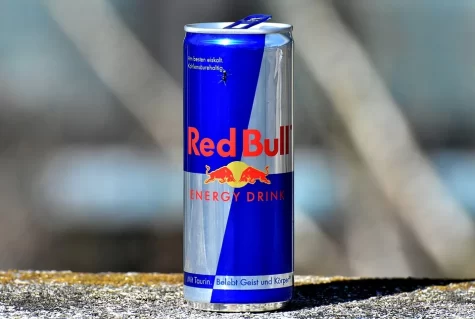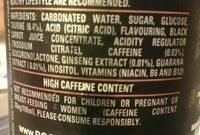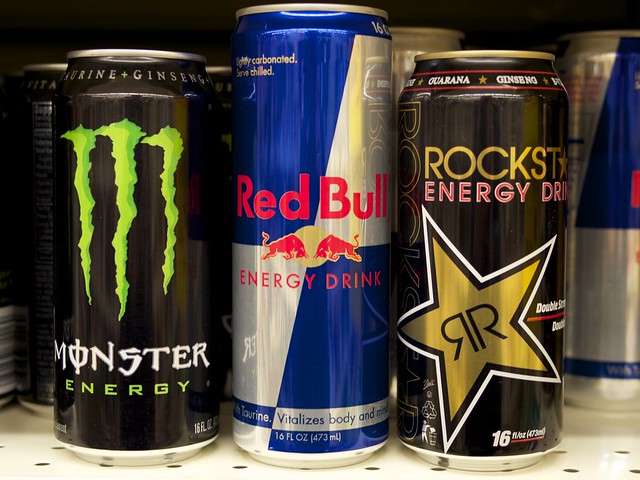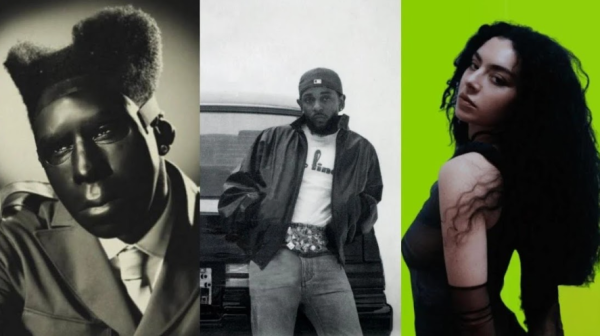Consequences of energy drinks
It’s 10:00 on a Sunday night, and you have an essay due at 11:59 that you’ve been procrastinating all weekend. As you open Google Classroom to begin working on your essay, you begin to drift asleep. Knowing you have to get the article done on time, you go to the fridge and drink an energy drink, thinking it’ll give you enough energy to finish your essay on time.
As you’re working, your chest starts to hurt, you can feel your heart fluttering, and then darkness. You wake up in a hospital room, hooked up to an IV with machines beeping, too weak to move an arm.
This could be caused by drinking energy drinks like Red Bull and Monster, especially if you’re a
kid.

Source:https://pixabay.com/photos/red-bull-energy-drink-drink-3301415/
Drinks like Red Bull are energy drinks. They do this by increasing the heart rate and forcing the body awake with caffeine, certain herbs, and other ingredients.
Although energy drinks may seem harmless, they mess with the heart and with blood pressure, which isn’t healthy.
According to The Atlantic, “A U.S. government report found that from 2007 to 2011, the number of emergency-department visits involving energy drinks more than doubled, to nearly 21,000.” This obscene number of hospitalizations induced by energy drinks is not ok.
Usually, products that contain drugs like nicotine are regulated, but caffeine is not. This allows energy drinks to target a specific group of people: kids.
“A 2017 study published in the journal Public Health Nutrition, for example, tested whether young consumers perceived energy-drink advertising as being targeted at people their age and younger,” says The Atlantic. “Among the youngest subjects—those ages 12 to 14—nearly 72 percent of participants who viewed an advertisement featuring the company’s sponsorship of the X Games, an extreme-sports event, perceived the ad to be targeted to people their age and younger.”
Kids are a vulnerable and gullible group who don’t have the maturity or awareness to realize that energy drinks are unsafe to drink and could potentially cause damage.
Kids should be protected from greedy companies who market harmful products to kids knowing that the kids won’t know or care about the risks.
As stated earlier, the FDA regulates certain products with drugs like nicotine. Caffeine is a potentially dangerous drug as well and should be treated as such.
Because “The FDA doesn’t regulate the amount of caffeine in beverages, Schnee says, so you can’t always trust what you see on the label. “A can might say it contains 200 milligrams but actually has 250. There’s no regulation,” says The Atlantic.
Legislators have responded to the problem of energy drinks, but not much change has been made, reported The Atlantic. “A South Carolina bill to ban sales to kids under 18—and to fine those caught selling the drinks to minors—advanced through the legislature in April, and is now pending before the state’s full medical-affairs committee.”
These bills need to be passed into law in order to protect kids from the seemingly harmless drink full of artificial and unhealthy energy boosters.
Cola soda contains caffeine, so one would assume that if cola is ok to drink, then energy drinks would be ok to drink. However, this is false.
“A cup of cola contains about 45 milligrams of caffeine, while a cup of coffee has about twice that. Energy drinks vary widely, depending on the brand and the size of the can or bottle. But some can pack a punch of 400 milligrams or even 500 milligrams of caffeine per container” says The Cleveland Clinic.
A cup of coffee has around 95 mg of caffeine. In comparison, 5-hour energy has 200 mg of caffeine, 2 times as much caffeine as one cup of coffee, according to LiveScience.
“Higher coffee consumption was significantly associated with reduced brain volume — essentially, drinking more than six cups of coffee a day may be putting you at risk of brain diseases such as dementia and stroke,” according to ScienceDaily.
6 cups of coffee are 570 mg of caffeine. One particular energy drink Hyde Xtreme (the 12 fl oz type) has 400 mg of caffeine. Drinking 2 a day can increase the risk of brain damage. 3 hour-energy can increase the risk of brain damage.
No wonder “The American Academy of Pediatrics says that energy drinks should be totally off-limits to kids and adolescents.” The data is there. Energy drinks just aren’t appropriate for kids.
Energy drinks aren’t good for adults either, says pediatric dietitian Diana Schnee. “I wouldn’t … recommend that adults drink them.”
Despite the science against them, energy drink corporations continue to fight back to stay in the market unregulated.
Energy drink manufacturers argue that they are being unfairly targeted. At the Connecticut hearing, the head of public affairs for Red Bull North America, Joseph Luppino, maintained that there is no scientific justification to regulate energy drinks differently than other caffeine-containing beverages such as soda, coffee, and tea,” reported The Atlantic.
This statement is blatantly untrue. Countless doctors, dietitians, and experts have all come out against energy drinks for kids.
“In the spring of 2017, Gary Watts, the coroner for South Carolina’s Richland County, released the autopsy results for Davis Cripe. … The cause of death: a caffeine-induced cardiac event causing a probable arrhythmia,” according to The Atlantic. More must be done to prevent the next child from dying from a cardiac arrest.
Energy drinks have an obscene amount of straight caffeine, more than double that of coffee. However, some contain substances that contain caffeine. “Guarana, commonly included in energy drinks, contains caffeine. Therefore, the addition of guarana increases the drink’s total caffeine content,” according to NCCIH.
The NCCIH also states that “caffeine may cause serious heart and blood vessel problems such as heart rhythm disturbances and increases in heart rate and blood pressure. Caffeine also may harm children’s still-developing cardiovascular and nervous systems.”
Energy drink companies continue to argue that there’s no scientific proof behind energy drinks being bad for people. That statement ignores the mountain of data reputable sources are showing and refutes actual scientific evidence in favor of fake science that doesn’t make energy drinks look bad.
Energy drink bottles have warning labels that warn people about potential risks the drink poses yet the companies who manufacture the energy drinks say that there are no health risks derived from drinking an energy drink.

Source: https://world.openfoodfacts.org/product/5000382036012/rockstar-punched
This has left people questioning the morals of energy drink companies. “ I think it’s a marketing strategy to say there’s no science behind it and it’s hypocritical,” said iSchool freshman Saadman Nur.
This does not mean that energy drinks should be banned or have age limits like nicotine products. If drunk in moderation, then energy drinks shouldn’t be much of a health risk to adults.
The same cannot be said for children. Although most things are ok in moderation, energy drinks aren’t one of those things. With a crazy amount of sugar, artificial flavors, and unhealthy amounts of caffeine, energy drinks just aren’t good for kids even in small amounts.
Nothing will happen if you drink a few but it’s not worth the risk of heart problems for an extra boost.
High school students drink energy drinks more than younger groups and have a lot to say on the topic.
One particular student Saadman Nur learned the hard way that energy drinks are not the energy-boosting miracle drink they’re advertised to be.
Saadman started out with one Red Bull during his lunch period. The next day he bought another. Saadman quickly realized that the energy crash after drinking a Red Bull was not worth the short-lasting energy boost the drink gave him.
After a few days and many cans of Red Bull, Saadman realized that he was addicted: “when one gave me a crash I wanted to drink another to feel awake and the cycle continued.”
Whether this is a marketing scheme to make people buy more, or unintentional, it’s not ok.
It’s even worse when paired with the fact that these side effects affect kids more, and energy drinks are targeted toward kids.
Saadman added that regulating caffeinated drinks could be a good idea, like a higher age limit to protect kids.
Ads targeting kids is “bad because kids shouldn’t have energy drinks,” said Saadman.
Kids will do something even though they know it’s bad for them. This includes drinking energy drinks. It’s really easy to fall into the trap of constantly drinking energy drinks to avoid the energy crash.
Caffeine is amongst the most addictive substances in the world requiring only 100mg per day to become addicted which is well below the amount of caffeine in each energy drink no matter what size.
It’s really easy to drink one for the first time and fall into a cycle of drinking 4 or 5 energy drinks per day, as high school freshman Matthew Marsh did.
In fact, Marsh drank so many energy drinks that he “went to the hospital” because the energy drinks were “ruining [his] heart.”
He “couldn’t sleep for a while” which really affected his physical and psychological health.
Energy drinks make you feel “jittery and annoying” according to high school freshman Malachi Peters.
“You have one energy drink then can’t survive without another one.”
Energy drink companies have no regard for their customer’s health.
They target kids with products that can cause kids to be hospitalized.
They ignore and refute proven science and then put a label on their products that contradicts what they’re saying.
Energy drink companies are “ridiculous” and “scheming” according to Peters. They’re “low down and dirty.”








